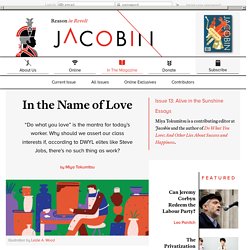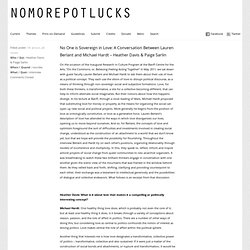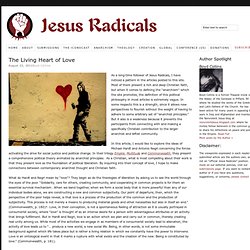

In the Name of Love. “Do what you love.

Love what you do.” The commands are framed and perched in a living room that can only be described as “well-curated.” A picture of this room appeared first on a popular design blog, but has been pinned, tumbl’d, and liked thousands of times by now. Lovingly lit and photographed, this room is styled to inspire Sehnsucht, roughly translatable from German as a pleasurable yearning for some utopian thing or place. Despite the fact that it introduces exhortations to labor into a space of leisure, the “do what you love” living room — where artful tchotchkes abound and work is not drudgery but love — is precisely the place all those pinners and likers long to be. There’s little doubt that “do what you love” (DWYL) is now the unofficial work mantra for our time.
Superficially, DWYL is an uplifting piece of advice, urging us to ponder what it is we most enjoy doing and then turn that activity into a wage-generating enterprise. You’ve got to find what you love. Watch Alain Badiou Explain Money. No One is Sovereign in Love: A Conversation Between Lauren Berlant and Michael Hardt – Heather Davis & Paige Sarlin. On the occasion of the inaugural Research in Culture Program at the Banff Centre for the Arts, “On the Commons; or, Believing-Feeling-Acting Together” in May 2011, we sat down with guest faculty Lauren Berlant and Michael Hardt to ask them about their use of love as a political concept.

They each use the idiom of love to disrupt political discourse, as a means of thinking through non-sovereign social and subjective formations. Love, for both these thinkers, is transformative, a site for a collective becoming-different, that can help to inform alternate social imaginaries. But their notions about how this happens diverge. In his lecture at Banff, through a close reading of Marx, Michael Hardt proposed that substituting love for money or property as the means for organizing the social can open up new social and political projects. More generally he begins from the position of love as ontologically constitutive, or love as a generative force. Lauren Berlant is George M. Love it! Slavoj Žižek: Love as a political category /// 16th May 2013. The Living Heart of Love. As a long-time follower of Jesus Radicals, I have noticed a pattern in the articles posted to this site.

Most of them present a rich and deep Christian faith, but when it comes to defining the “anarchism” which the site promotes, the definition of this political philosophy in most articles is extremely vague. In some respects this is a strength, since it allows new perspectives to flourish without the weight of having to adhere to some arbitrary set of “anarchist principles.” But it also is a weakness because it prevents the participants from connecting with and making a specifically Christian contribution to the larger anarchist and leftist community.
In this article, I would like to explore the ideas of Michael Hardt and Antonio Negri concerning the forces activating the drive for social justice and political change. In their trilogy Empire, Multitude and Commonwealth, they present a comprehensive political theory animated by anarchist principles. But this love can also be corrupted. The Living Heart of Love.